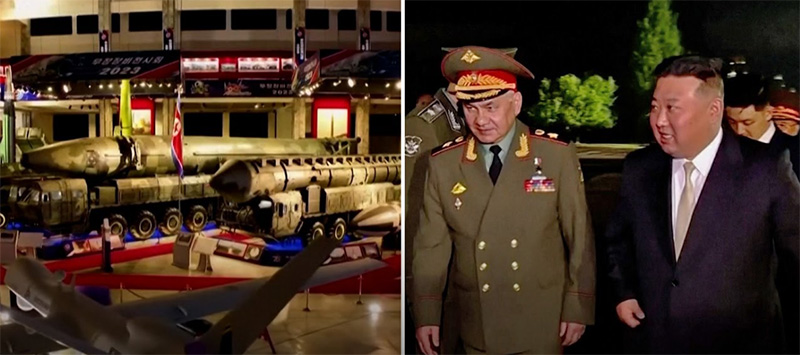 The Minister of Defence of the Russian Federation, Army General Sergei Shoigu and the President of the Democratic People's Republic of Korea Kim Jong Un.
The Minister of Defence of the Russian Federation, Army General Sergei Shoigu and the President of the Democratic People's Republic of Korea Kim Jong Un.
The 70th anniversary of the signing of the Korean Armistice Agreement stealthily approached last Thursday. One principal reason for the curiosity must be the contemporary relevance of the Korean War, which was also a proxy war for the Cold War, like the US’ ongoing war in Ukraine against Russia, which is also in a stalemate insofar as the NATO failed to win the war, and another humiliating defeat, but much worse than in Afghanistan, is probably in store, notes M.K. Bhadrakumar, Indian Ambassador and prominent international observer.
It is China which has the greatest stakes in resurrecting the true lessons of the Korean War. What perturbs Beijing is not only that the Washington elite have not only drawn some wrong lessons, but they are also “all targeted at China, specifically referring to the Taiwan question.”
The fact of the matter is that the US paid a heavy price by its intervention in a proxy war in the Korean Peninsula, predicated on flawed premises — to begin with, misperceiving the conflict as the first step in a Soviet plan under Stalin to use military means to achieve global dominance. (Around 36000 US military personnel were killed in Korea, out of a total of around 40,000 deaths for the UN forces combined.)
Equally, the US made the catastrophic overreach to ignore Peking’s warnings as bluffing and blithely estimated that China wouldn’t intervene if the US forces crossed the 38th parallel. Gen. Douglas MacArthur, the US commander, assured President Harry Truman that China would not enter the war. (But Mao already had decided to intervene after concluding that Beijing could not tolerate US challenges to its regional credibility!)
Similarly, invading North Korea was an incredible blunder that transformed a three-month war into one lasting three years.
However, a historically contentious detail still remains without definitive conclusion — that the US had toyed with the idea of using atomic weapons against North Korea (and possibly China as well) with a view to shift the overall military balance in its favour and force them to the negotiating table. Indeed, both President Truman and his successor Dwight Eisenhower continued to posit that such an option was on the table, as it emerged by the end of the summer of 1950 already that the good guys would lose the war.
Of course, in the event, an atomic attack by the US never materialised.
The bottom line is that in the Korean War, the US confronted the hard truth that threatening a nuclear attack would not be enough to win the war. And the nuclear Korean War simply petered out. That is a historical truth that is unlikely to be forgotten today as a “lesson” when the US faces not one but three nuclear powers in Northeast Asia and all three with deterrent capability.
That is why the visit by a US nuclear ballistic missile submarine to Busan, South Korea, on July 22, the first visit by a US submarine since 1981, which some US congressmen interpret as not only a warning to North Korea but also a deterrent against China, can only be seen as empty bravado.
Against such a historical complex backdrop, a ‘Global Times’ editorial hit out: “China decided to resist the US aggression and aid North Korea during the Korean War, it had repeatedly sent stern warnings that if US forces crossed the 38th parallel China would not sit idle. However, the US did not take it seriously, thinking that China was only making empty threats and would not take action. As a result, they were caught off guard when they encountered the Chinese People’s Volunteers Army on the battlefield. Today, a similar major misjudgment toward China is occurring in Washington. The biggest difference between now and the Korean War era is that China’s strength has greatly increased. The consequences of infringing upon China’s security interests and national sovereignty will undoubtedly be much more severe… However, it must be clear that if there is another strategic misjudgment this time, the price it will pay will surely be much higher than 70 years ago.”
Anyway, there has been a paradigm shift today. Russia today has nuclear superiority over the US and its allies. Unlike during the Korean War, North Korea and China now possess nuclear weapons and missiles to deliver them. But a cardinal difference in this paradigm shift is also that neither Pyongyang nor Beijing developed nuclear weapons capabilities as part of plans to initiate a war but, instead, to deter a US attempt to destroy them. The same holds good for Russia in Ukraine, M.K. Bhadrakumar stresses.
read more in our Telegram-channel https://t.me/The_International_Affairs

 11:25 01.08.2023 •
11:25 01.08.2023 •






















